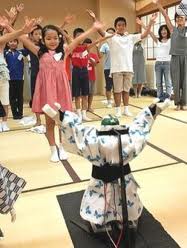Why kids like robots more than families and schools: A recent Study Reveals – Part 3
Saturday, February 4th, 2012 3:28:12 by Usman Khalid
The deeper implication of the study, however, is that, psychologically, kids are very receptive to a future where robots are an integral part of their lives. As robust robotics classes, after-school robotics programs, and robotics competitions bring robots into everyday reality, we might want to ask: will robots in the classroom and as “study companions” in the home ultimately make teachers and parents redundant?
Sir David King, England’s chief scientist back in 2006, seemed to hint as much when he said we would have ubiquitous conscious robots by the year 2056. Henrik Christen, Director of the Center of Robotics and Intelligent Machines at the Georgia Institute of Technology, takes that projection a step further when he argues, “If we make conscious robots, they would want to have rights and they probably should.” If robots have rights, if they can vote, sue, and receive a range of social benefits, including income support, housing, and possibly robo-heathcare, is it that such a far cry from their admission to the American Federation of Teachers?
That reality is closer than you might realize. In Japan and South Korea,robots are already allowed to run entire classes. In South Korea, in particular, hundreds of robots have already been “hired” as teacher aides, classroom playmates, and foreign language instructors.
If you think a robot-run classroom in the U.S. is preposterously far away, imagine that it took only thirty years to go from huge mainframe computers performing mundane tasks to today’s Siri digital assistant. If we extrapolate from Moore’s Law, which ostensibly deals with the doubling of computer chip performance every 18 months, then self-learning, self-improving robot instructors could be commonplace fairly soon. This was confirmed by an exhaustive July 10, 2010 New York Times article on the lightning-fast progress being made on the social, affective, and teaching capabilities of a range of robots around the U.S.
Indeed, a Jetsons-like future might arrive sooner than we ever imagined. However, Bill Joy, of Sun Microsystems, in his seminal Wired essay, “Why the Future Doesn’t Need Us,” warned against a rosy techno-futurism where conscious, self-replicating robots do the hard work of a robot-dependent humanity. As the Latitude study ominously shows, in a battle between parents, teachers, and intelligent machines, we already know whose side the kids are on.
Tags: children, latitude, parents, robots, schools, Teachers
Short URL: https://www.newspakistan.pk/?p=11758

















